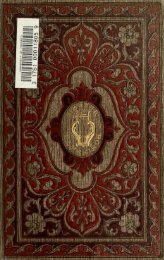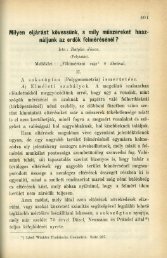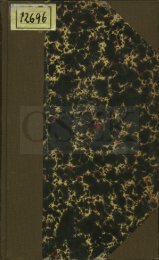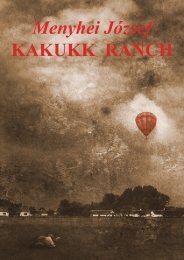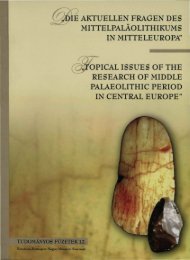Hungarian-Mesopotamian Dictionary (HMD)
Hungarian-Mesopotamian Dictionary (HMD)
Hungarian-Mesopotamian Dictionary (HMD)
You also want an ePaper? Increase the reach of your titles
YUMPU automatically turns print PDFs into web optimized ePapers that Google loves.
ALFRÉD TÓTH : HUNGARIAN-MESOPOTAMIAN DICTIONARY (<strong>HMD</strong>)<br />
<strong>Hungarian</strong><br />
Proto-Finno-Ugric<br />
Sumerian<br />
glide"<br />
<strong>Hungarian</strong><br />
Proto-Finno-Ugric<br />
Sumerian<br />
<strong>Hungarian</strong><br />
Akkadian<br />
<strong>Hungarian</strong><br />
Akkadian<br />
<strong>Hungarian</strong><br />
Sumerian<br />
Akkadian<br />
<strong>Hungarian</strong><br />
Proto-Finno-Ugric<br />
Akkadian<br />
<strong>Hungarian</strong><br />
Proto-Altaic<br />
Proto-Finno-Ugric<br />
Akkadian<br />
kérni “to ask for, to look for”<br />
*kerз- “to ask, to request”<br />
gir (13x: Old Babylonian) wr. gir5 "to ask for asylum; slip (in or through),<br />
kerek “round”, kerék “wheel”, keríteni “to enclose, to fence in”, kert<br />
“garden”, kerülni “to avoid; to go in a roundabout route”<br />
*kerä-, *keerä- “round; to roll, to turn, to wind<br />
gur, wr. gur2 “loop, hoop, circle”, kiri6 “garden”: kirimah (14x: Ur III) wr.<br />
ĝeškiri6-mah “pleasure garden, park”, ukiri (4x: Ur III, Old Babylonian) wr. u2-<br />
ĝeškiri6 “garden produce” (u2 “bed”)<br />
kerep “the biggest boat used for watermills”<br />
karpatum “pot, vessel” (cf. English ship < Gothic *skipa- “ship, also vessel”)<br />
kerep “lotus”<br />
qarbuhu “a plant”<br />
kérész “mayfly”<br />
giriš (2x: Old Babylonian) wr. giriš “butterfly”<br />
kurşiptu<br />
kérődzik “to chew the cud, to ruminate; to brood, to speculate over sth.;<br />
to eruct; to say”<br />
*kerз- “to belch; to fart”<br />
arūm “to empty oneself”. PFU *kerз- would correspond to Sum. *ger- and this<br />
to Akk., Rhaet. *wer- > *er-/*ar-, since initial *w- disappeared in Akk. and<br />
Rhaet. in the 18th century B.C. (Brockelmann 1908, p. 139). The changing of<br />
a- > e- is typical for Rhaetic, cf. Rhaet. al-, Akk. el- “god” (Tóth and Brunner<br />
2008, p. 104).<br />
kés “knife”<br />
*k’i_ut’u “a kind of knife or arrow”<br />
*kečз “knife”<br />
qazāzum “to cut, to cut off”<br />
<strong>Hungarian</strong> késa “a provincial term used to describe legal battles over territory near<br />
rivers”, késálni, késálkodik “to fight, to struggle, to battle”<br />
Proto-Finno-Ugric *kiśkз- “to rend, to tear”<br />
Sumerian ĝeš-kiĝ-ti “artisan, forge” (Lieberman 1977, no. 295)<br />
Akkadian<br />
kiškattu, kiškittu “weapon”<br />
<strong>Hungarian</strong><br />
Sumerian<br />
<strong>Hungarian</strong><br />
Proto-Ugric<br />
Sumerian<br />
Akkadian<br />
keselyű “vulture”<br />
KAŠEŠ, wr. KA.ŠEŠmušen “a type of bird”<br />
keseregni “to grieve over sth.”, kesergő “dirge, lament”, keseríteni “to<br />
embitter”, kesernyés “tart”, keserű “bitter”grief, sorrow, trouble, worry”<br />
*k8ćз(-rз)<br />
ĝiškim (60x: ED IIIb, Old Babylonian) wr. ĝiškim “sign, omen; trust, aid”<br />
giskimmu; cf. also kišpum “magic, witchcraft, omen”, kišubu “end of a song”<br />
___________________________________________________________________________________<br />
© Copyright Mikes International 2001-2007, Alfréd Tóth 2007 - 73 -


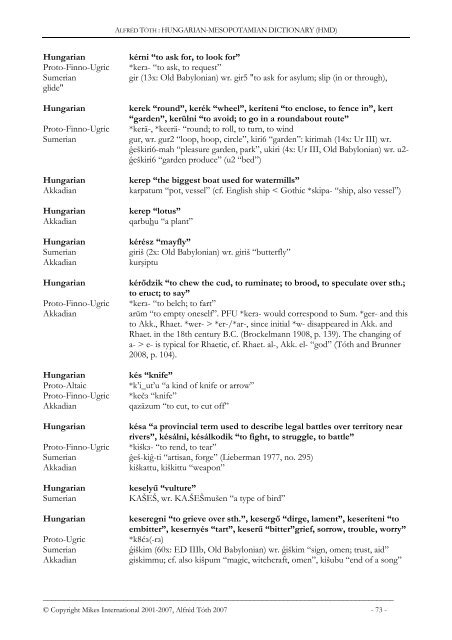


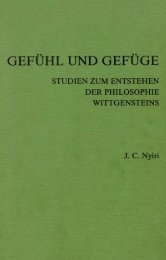
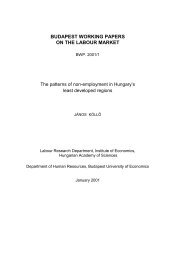

![Letöltés egy fájlban [4.3 MB - PDF]](https://img.yumpu.com/50159926/1/180x260/letaltacs-egy-fajlban-43-mb-pdf.jpg?quality=85)
